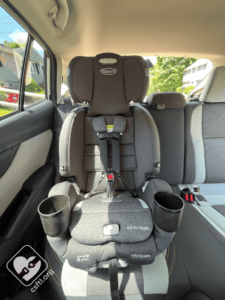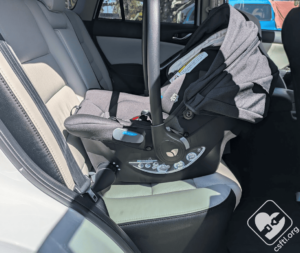NUNA PIPA lite rx + PIPA RELX Base Rear Facing Only Car Seat Review

(Last Updated On: February 1, 2022)
Nuna PIPA lite rx installed without the base
When the NUNA PIPA lite was released, it set a high mark for a well-featured, lightweight rear facing only infant car seat. However, it lacks one important thing: belt guides for a baseless installation. Pre-pandemic, I taught a Car Seat 101 class in person at a local hospital. Many of the families we taught had PIPA Lites and plans to travel by airplane fairly shortly after their children were born. They were almost always surprised to learn that the car seat they’d chosen couldn’t be installed without the base on an airplane! We’re pleased to see that the PIPA lite rx has joined the PIPA family of car seats, bringing back those belt guides and adding a few additional features along the way.
CSFTL Quick Stats
Weight range: 4 – 32 poundsHeight range: less than 32 inches tall and the top of the child’s head is less than one inch from the top of the seat’s shellOptional infant insert with removable low birthweight insert for children who weigh less than 11 poundsExpiration: listed on a label on the seat (7 years)Replace after a moderate to severe crash — follows NHTSA’s crash replacement guidelines
Measurements
Width at widest point (carrier handle): 17 inchesLowest harness position: 7 inches without the insertHighest harness position: 10.5 inches without the insert2 crotch buckle positions: 6 and 7 inches from the back of the seat pan without the infant insert (a third, shorter position can be made by affixing the crotch buckle to the outermost slot, then threading it through the innermost slot)Seat pan depth: 12.5 inchesBase width: 12 inchesCarrier width: 17 inches at the handleBase length: 24 inchesCarrier weight: 7 poundsBase weight: 16.5 pounds
Features
Includes PIPA RELX baseNo rethread harnessDream Drape canopyLightweight carrierLow birthweight insert (inside the body support, remove at 11 pounds)European style baseless routingRigid lower anchors with 3 position retraction on the baseStability (load) leg on the baseOn the go recline adjustment
PIPA Family Tree
There are now 6 PIPA models in the family. Here’s a handy chart to help you keep track of them!
Both the PIPA rx (reviewed here) and the PIPA Lite r include the new PIPA RELX base. We’ll talk more about this pretty awesome base later in this review. NUNA weighs the carriers without the canopy or infant insert. These items typically add about 1.5 pounds. We weigh seats with all of those items on the seat.
PIPAMSRPBase IncludedWeight*Installation MethodDream DrapeNo Rethread HarnessThese models include the PIPA RELX base but are compatible with the original (PIPA series) basePIPA rx + PIPA RELX base$379.95PIPA RELX base7.5 poundsWith or without baseYesNoPIPA lite r + PIPA RELX base$399.95PIPA RELX base5.3 poundsWith baseNoNoPIPA lite rx + PIPA RELX base$499.95PIPA RELX base6.9 poundsWith or without baseYesYesThese models include the original base but are compatible with the PIPA RELX basePIPA$319.95PIPA series (original) base8 poundsWith or without baseYesNoNUNA PIPA lite$349.95PIPA series (original) base5.3 poundsWith baseNoNoNUNA PIPA lite lx$399.95PIPA series (original) base5.7 poundsWith baseYesNo
Unique Features
With a product lineup of 6 quite similar seats with nearly identical names, we wanted to point out the things that make the PIPA lite rx different from the other members of the family.
No Rethread Harness and Review Dog
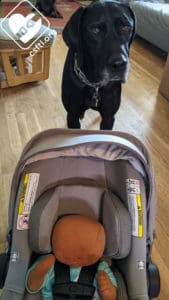
NUNA PIPA lite rx review dog
The PIPA lite rx is the only PIPA that has a no rethread harness. The harness adjusts quite easily by pulling a tab at the top of the headrest, compared to the other PIPAs that require caregivers to disconnect the harness, then move the straps up, and reconnect the harness. We do sometimes notice that no rethread harnesses can cause a bit of head slump in the tiniest passengers — our newborn doll slumped just a bit while our preemie doll did not. Since none of the additional padding is required, (though the low birthweight pillow inside the infant insert must be removed at 11 pounds) we’d urge caregivers to check the fit on their child with the padding in and out to see what works best.
More on the harness fit and this headrest in the Fit to Child section of this review. Review dog Benson was happy to stand guard over our model doll to help show this headrest.
Baseless Belt Guides
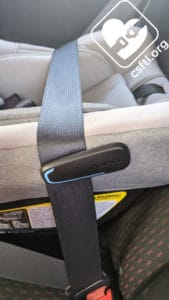
NUNA PIPA lite rx baseless belt guide
The PIPA lite rx marks the return of the belt guides, this seat can be installed without the base. We spent some time installing the seat this way and found that it wasn’t as easy as we would have liked. More on this later in our review.
Euro Routing
Not only can the PIPA lite rx be installed without the base, it has Euro routing, which uses pretty much the entire length of the vehicle seat belt for a secure installation. This type of routing can be really useful when travelling in ride shares or when catching a ride with family or friends. We realize that the pandemic has put the kabosh on a lot of “babies in ride shares” but one day that scenario may return.
Infant Insert
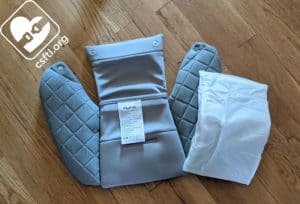
NUNA PIPA lite rx infant inserts
This version of the PIPA includes a very nice infant insert that has something kind of quirky — an extra bit of padding that ships tucked into the insert itself.
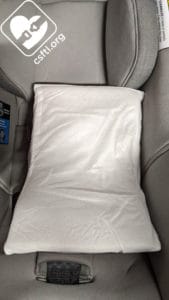
NUNA PIPA lite rx infant insert
This insert is mentioned in the manual — and on the larger insert but not on the unfinished-looking low birthweight insert itself. I joke that this insert looks kind of like a maxi pad.
It is optional but must be removed when the child weighs 11 pounds. We’d suggest that caregivers label both pieces (perhaps by writing the seat name and adding a short description of each on fabric tape) when the padding isn’t in use.
Buckle Tongue Holders
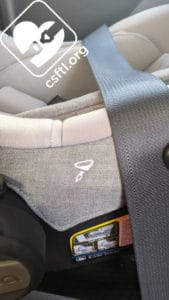
NUNA PIPA lite rx buckle tongue holders
The PIPA lite rx takes the already-quite-nice buckle tongue holders that we know from the other PIPA seats to a new level — MAGNETS! The buckle tongues practically find the holders themselves, then stayed there until it was time to harness the child.
RELX Base
Carrier Release
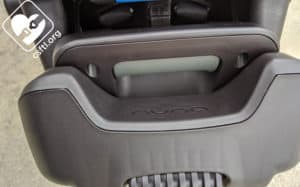
NUNA PIPA RELX base carrier release handle
The carrier release handle is mounted on the base itself (this is a little different than many other rear facing car seats that have this handle on the carrier). To remove the carrier from the base, squeeze this handle up, then lift the carrier out of the base.
PIPA RELX Base Compatibility
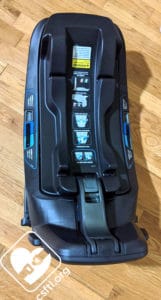
NUNA PIPA PIPA RELX base
The seat includes NUNA’s PIPA RELX base. This base is compatible with all PIPA car seats. The manual clearly states to follow the directions included with your particular PIPA when using the PIPA RELX base.
PIPA RELX Base vs. the Pipa Series Base, a Quick Summary
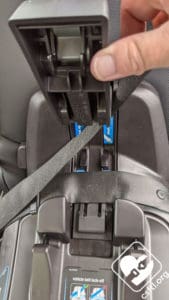
NUNA PIPA RELX base seat belt in lockoff
The PIPA lite rx includes the new PIPA RELX base. It’s hard to talk about this updated base without discussing the original PIPA Series base so we’ll do a quick comparison. The original base has a lot to offer — rigid LATCH and a load leg foremost among the features. It also had some challenges with fit to vehicle and with reading the recline angle indicator — the original base has a bubble indicator with a single line. The bubble must touch part of the line. That sounds simple enough, but many caregivers found this quite confusing or found that their vehicle didn’t allow for the correct recline angle. The new base includes a different type of recline angle indicator that’s a bit easier to read.
The PIPA RELX base also includes an updated lockoff device that includes separate spaces for the lap and shoulder portions of the vehicle seat belt. This is an important change that makes the lockoff a lot easier to use because the vehicle seat belt doesn’t bunch up in the lockoff!
Also on the base is an anti-rebound panel. This isn’t mentioned in the manual, probably because it doesn’t require any additional adjustment.
Stability (Load) Leg
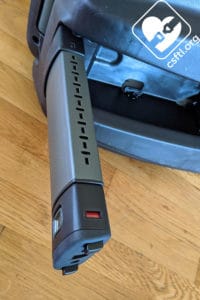
NUNA PIPA RELX base load leg in the shortest position
The RELX base includes a load leg with multiple positions that accommodate smaller spaces — the original base has a load leg that’s often too long for the middle seating position in vehicles that have a pronounced hump on the floor. More than a handful of times, I’ve found myself telling caregivers that they need to choose between using the features they’ve paid for (load leg and rigid lower anchors) or using the PIPA in the middle vehicle seat (in most cases, the lower anchors can only be used in the outboard seating positions). Adding the shorter position on the load leg and an improved lockoff means that the PIPA RELX base can be a terrific option in those middle seating positions.
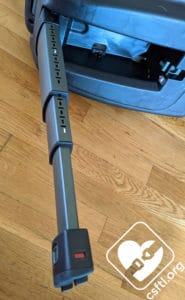
NUNA PIPA RELX base load leg in the longest position
Of course, the PIPA RELX base’s load leg extends to longer positions as well.
Rigid Lower Anchors
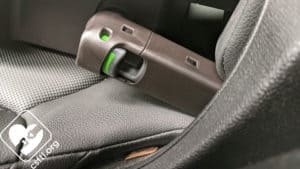
NUNA PIPA RELX base rigid lower anchors
Like the original base, the PIPA RELX base includes rigid lower anchors. Installing the previous version of the base with a vehicle seat belt often meant that the seat belt would interfere with the stubby little rigid lower anchors on the outside of the base.
The PIPA RELX base’s anchors are less likely to get in the way, though they’re still attached to the outside of the seat’s shell and pivot into position. The difference here is that the lockoff has two sections — lap belt and shoulder belt — this innovative design moves the belt path into two sections, avoiding interference with the lower anchors.
Lower Anchor Guides
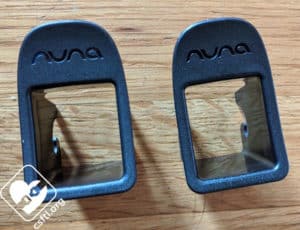
NUNA PIPA lower anchor guides
The seat includes a set of handy plastic guides that can help a caregiver visualize or more easily access the lower anchors in the vehicle.
BMW 3 Series
In the CPST community, the PIPA base was a bit notorious for not working in BMW 3 series vehicles. The combination of the vehicle seat’s shape and one angle only for the rigid lower anchors made it pretty much impossible to install the Pipa securely in that vehicle. Well! The first thing NUNA’s rep told us during a recent webinar is that the new base fits into the BMW 3 series! We will make every effort to confirm this, probably after the pandemic is over.
This update to the base takes everything that was problematic with the old base and resolves them in ways we hadn’t expected.
Recline Adjustment
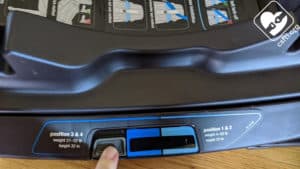
NUNA PIPA RELX base recline angle adjuster
The original base had a recline foot to help with the recline angle adjustment. It was fairly clunky and required a manual extension that wasn’t obvious to most of the parents I teach. This always surprised me a bit, considering how high-end the seat is. The recline angle adjustment on the PIPA RELX base is completely different!
The recline angle can be adjusted after the base is installed. This is something we’re seeing more often these days, marketed as a way to change the recline angle as the child grows. I’m not totally convinced that it’s a feature that needed to happen for that purpose — we don’t see a lot of caregivers who worry too terribly much about the recline angle on a rear facing only car seat after it’s been installed for their infant. But, the convenience of being able to press a button after the seat is installed to get the correct recline angle is pretty awesome. Actually pressing the button requires a bit of force but once it’s engaged, just slide the carrier forward or back to change the angle. The adjustment is secure when the carrier is locked into place.
This 4 position adjustment has two ranges: positions 1 and 2 are for children who weigh between 4-20 pounds, positions 3 and 4 are for children who weigh between 21-32 pounds. Now. It’s highly unlikely that a 32 pound child would fit in thifs seat. It is, however, fairly likely that a 21 pound child would still be using this seat. We are hopeful that caregivers remember to move this adjustment as the child grows.
Installation
With the Base
In case we haven’t been clear enough up this point, installing the RELX base is usually quite simple. That ease of installation is what brings the most value to the PIPA family, especially to PIPAs that use the RELX base.
Vehicle Seat Belt
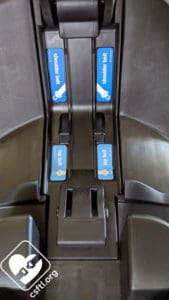
NUNA PIPA RELX base lockoff open
This is where the PIPA RELX base differs from the PIPA series base — the 2 section lockoff has clearly marked spaces for the lap and shoulder portions of the vehicle seat belt. I’ll start this section with a caveat — my vehicle, a 2011 Mini Countryman, has a fixed buckle and a shoulder belt that’s mounted in kind of an odd spot on the pillar behind the vehicle seat. This configuration has led to many a challenging installation so take all of my struggles with a Mini-sized grain of salt. The seat belt geometry meant that I needed to work just a little harder to install the PIPA RELX base using the vehicle seat belt than it would be in almost every other vehicle on the planet.
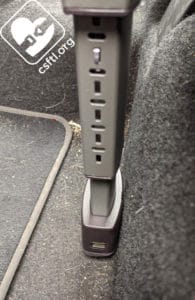
NUNA PIPA RELX base load leg
Set the base on the vehicle seat, then turn it on its side and extend the load leg. Flip the base so the load leg is pointed toward the vehicle’s floor and extend the leg until it reaches the floor.
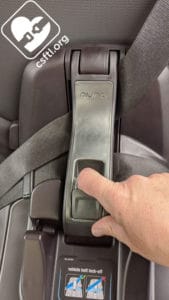
NUNA PIPA RELX base release lockoff
Now, turn your attention to the base itself. Pull up on the lockoff to open it and thread the vehicle seat belt through the belt path. Make sure the lap and shoulder portions align with the proper section of the lockoff. This is where my car requires a little extra effort — I found that I had to really push the base into the vehicle seat while pulling on the vehicle seat belt to remove the slack in order to get a secure install.
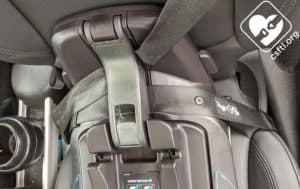
NUNA PIPA RELX base lockoff closed
Once the slack is removed from the vehicle seat belt, hold the tension in place and close the lockoff. Check for movement at the belt path by giving the base a firm handshake. If the base moves less than one inch at the belt path, the installation is secure.
Installation
Without the Base
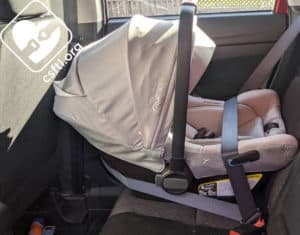
NUNA PIPA lite rx installed without the base
This installation method is what sets the PIPA lite rx apart from the group — it’s quite lightweight but still has those belt guides for a baseless installation.
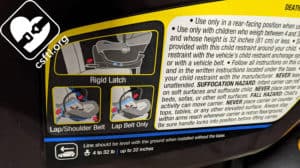
NUNA PIPA lite baseless instructions
To install the seat without the base, set it on the vehicle seat with the harness facing the back of the vehicle.
Note: the carrier has a label that shows the handle in the most upright position for this type of install but the manual does not specify that it is required.
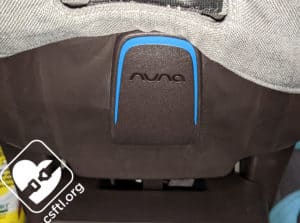
NUNA PIPA lite rx baseless shoulder belt guide
Carefully pull the vehicle seat belt out and thread it through the two belt guides near the child’s feet. Then, slowly extend it around the carrier and slide the shoulder portion of the belt into the belt guide on the back of the carrier — all without letting the carrier tip forward toward the vehicle seat back. In most cases, this will use all of the slack in the vehicle seat back and cause the belt to switch modes to secure the seat belt, possibly before you’re ready for it.
This was more challenging than I would have expected, the seat REALLY wanted to tip to the side or to the front. I had to really hold the carrier in place while I tightened the seat belt. I wonder if this was because the seat is so lightweight, it was a new issue for me at any rate. Eventually, I was able to get a secure install but it took some effort. I’d strongly suggest that caregivers who intend to use this seat as a carrier only take some time to master this installation method before hopping into a ride share vehicle.
Fit to Child
Preemie Doll
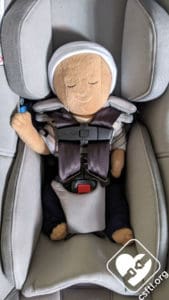
NUNA PIPA lite rx preemie doll
As always, our preemie Huggable Images doll is ready to model the seat. Our doll weighs 4 pounds and is 17 inches long. The doll is also of great interest to review dogs Benson and Kamo. Kamo remains with us as a foster dog, we hope that his forever family comes along soon, if for no other reason than the security of our doll collection.
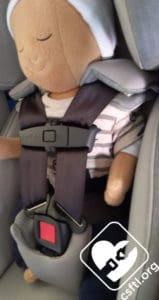
NUNA PIPA lite rx preemie doll extra space under harness
The PIPA lite rx is a little different from other seats in the PIPA family because it has a no rethread harness. Since we’ve seen more than one no rethread harnesses cause a bit of head slump in the tiniest passengers, we were eager to see how the PIPA lite rx stacks up. First, the preemie doll. With all of the padding in place, the harness fit is good, the straps are below the doll’s shoulders, and the doll’s head does not slump. However, there was another kind of unusual thing –the harness didn’t lay flat on top of the doll, it hovered over the doll’s torso.
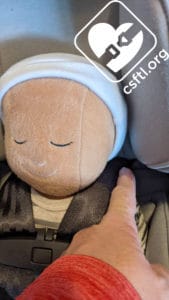
NUNA PIPA lite rx preemie doll
Since the padding is optional, we removed and found something kind of unusual (though not unheard of): I couldn’t get the harness tight enough for this doll. I flipped the carrier over (note: do not recommend doing this with an actual baby in the seat) and saw that the splitter plate was right up against the harness adjuster. We’d like to see a slightly smaller smallest setting so that this doesn’t happen to tiny babies.
Newborn Doll and Review Dogs
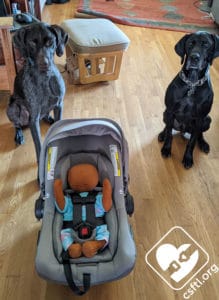
NUNA PIPA lite rx review dogs
Our newborn doll weighs 7 pounds and is also 17 inches long. The PIPA lite rx fit the doll pretty well, though we found a range in how well it fit depending on the padding in place. Benson and Kamo both remained interested in the doll, though Kamo had more of a desire to eat the doll’s head than Benson did. But back to our doll.
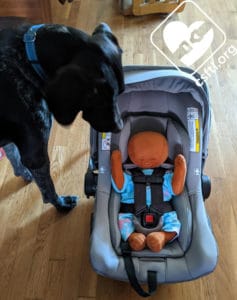
NUNA PIPA lite rx newborn doll with all padding
With all of the padding in and the harness covers on, the harness fit on our doll was pretty good. We noticed a teeny bit of head slump, given that, we’d encourage caregivers to check the fit on their child. But we encourage that all the time regardless.
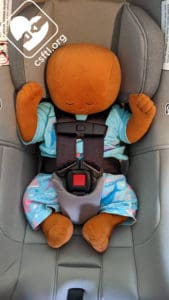
NUNA PIPA lite rx newborn doll with no padding
Naturally, we tried the fit without the padding and while it definitely varies depending on the child, for our doll, the fit was even better without the padding.
Important Information: Where to Find
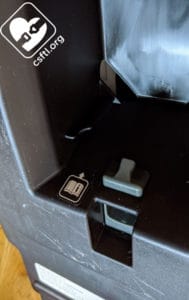
NUNA PIPA RELX base manual storage
Manual storage — the manual stores on the bottom of the base. There isn’t a separate storage manual location on the carrier so if you’re traveling with the carrier only, you may want to download a copy of the manual.
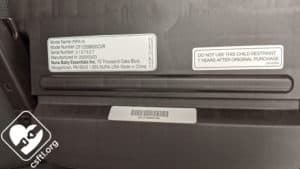
NUNA PIPA RELX base date of manufacture label
Date of Manufacture label — the PIPA lite rx expires 7 years after the date of purchase. This label and the date of manufacture label are on the bottom of the base.
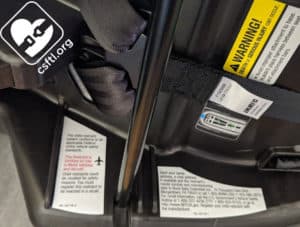
NUNA PIPA lite rx FAA approval label
FAA approval — the PIPA lite rx can be used on airplanes, with or without the base. The base’s length would pretty much require a First Class airplane seat to fit properly but the option is available. The FAA approval label is on the bottom of the carrier. Conveniently, it has a little picture of an airplane on it so it’s easy to identify.
Overall Thoughts
At this point, I’ve spent a fair bit of time with all PIPA models in the PIPA family of products. They’re all quite plush, easy to install and use properly for the most part, and well-liked by many of the families who use them. The PIPA lite rx offers the lightweight that makes the PIPA lite so popular but adds that very critical baseless install. I’d encourage families who plan to use that baseless installation on a regular basis to take some time to master the technique before heading off in a ride share.
